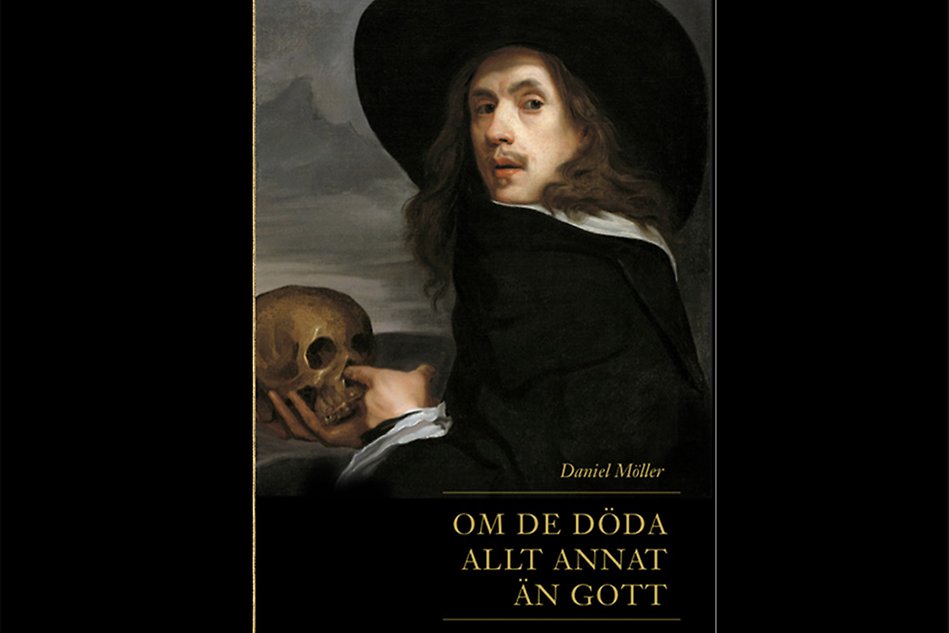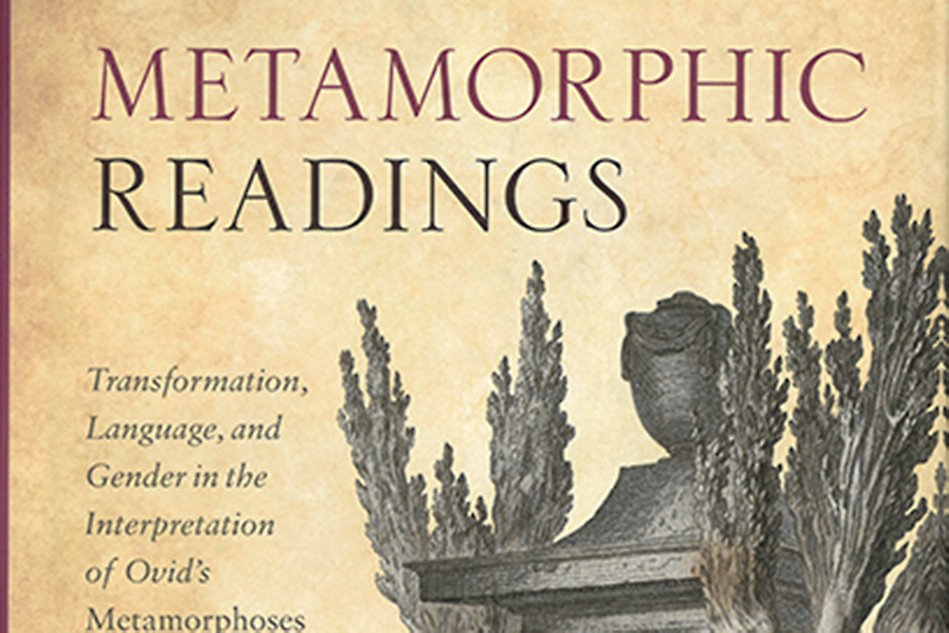Professor's portrait: The passion for poetry is Daniel Möller’s strength
In the small things – a poem about a wedding or a birthday 300 years ago – we can derive a great knowledge of history and people’s everyday lives. That is why occasional poetry is a great interest for Daniel Möller, new Professor of Comparative Literature/Comparative Literature. In a little more than a decade, he has become one of the most prominent researchers in Swedish poetry from the early modern period.
“I think it’s extremely important to enthuse the students and instil courage in them, so that they dare to try new thoughts and ideas, both during lectures and seminars and when they write essays.”
Daniel Möller

Daniel Möller works at the School of Education, Humanities and Social Science. “The school is developing into something big and exciting. It’s also fun to have a smaller environment and to be able to influence development and to help younger researchers progress in their careers. I still have many research colleagues in Lund and in many other places.”
The common thread in Daniel Möller’s research is occasional poetry, and it is above all poetry from the early modern period – the 17th and 18th centuries – that interests him.
“It’s about weddings, funerals, anniversaries and other occasions that people wanted to celebrate. Enormous amounts have been written,” says Daniel Möller.
Scholarships and grants
His scholarly output is unusually extensive, of extraordinarily high quality and original, according to evaluators. He has received scholarships from the Swedish Academy and two major grants from the Swedish Research Council, the latter of which is unusual for researchers in the humanities.
“My applications have probably aroused interest because they have pointed at a knowledge gap. I’ve done my thing and researched what I’ve wanted to research. I think it’s best if you get to devote yourself to a subject that you are passionate about. I have passionate approaches to both studies and research” says Daniel Möller.
Since his doctoral dissertation in 2011, Daniel Möller has carried out many literary projects. He is co-editor of the book Att dikta för livet, döden och evigheten: Tillfällesdiktning under tidigmodern tid” (“Writing for Life, Death and Eternity: Occasional Poetry in the Early Modern Period”), which covers many of the most important things he has done. To this can be added his current book about malicious funerary poems: Om de döda allt annat än gott (“Of the Dead, Say Anything but Good”) (Makadam förlag). In the 18th century, it was customary to take the opportunity to defame an antagonist who had passed away. The poems were burlesque, macabre and obscene.
“Even my most hardened friends hide their faces in their hands when they read the poems. It’s blunt. The 17th and 18th centuries are known for that.”

Daniels Möller’s latest book, which was published in September this year, is about wickedly humorous funerary poems. As a researcher, he spends a lot of time reading, analysing and categorising. Sometimes he also looks for finds in private archives. “It’s fun. Otherwise, I can get a kick, and not a small one either, from looking in the public libraries as well. In the National Library of Sweden in Stockholm, for example, I have found poems that I have been able to use in my research and write about.”
An example of a project to add to the list is a book about Olof von Dalin’s experimental occasional poetry and several books about the pekoral (“bad poetry”) and pastiches of it.
No boring poets
Daniel Möller loves to teach and to share his knowledge. It is a gain if the students discover literature and poetry.
“The poets I’m talking about aren’t boring, and it’s not just old men who rhyme pompously. Instead, they explore the borderlands of man and his psyche. Sometimes it’s pure rebellion. Take the modernist Dadaism, it’s a form of punk movement” says Daniel Möller.
“I think it’s extremely important to enthuse the students and instil courage in them, so that they dare to try new thoughts and ideas, both during lectures and seminars and when they write essays.”
A clear opportunity for students to test and dare is during the new course in creative writing, which starts in the spring under Daniel Möller’s leadership. In general, he likes to associate music with poetry. It happens that he sings a bit of a medieval ballad for the literature students, and they are welcome to try to sing a little piece by Bellman.
“Young people can get so much out of reading poetry, and music can really be the way into poetry” says Daniel Möller.
“In our time, literature is bigger than ever. The internet is flooded with poems and other texts. There, everyone can become a poet, and young people in particular have such a strong need to communicate themselves. Another example is computer games, which is a narratological activity in which those who write and then play build the world they create.”
Sometimes students say that poetry can be so difficult: “It’s just the opposite. If you’ve found fiction, you have a friend for life” says Daniel Möller.
Funerary poetry for animals in context
When Daniel Möller started studying at university, he didn’t begin with literature – he wanted to save the most fun for last. When, after a period in the profession of upper secondary school teacher, he embarked on doctoral education, he had already come across strange poems to dead animals during previous essay writing. The theme of his dissertation was funerary poetry for animals, a subject that was relatively unexplored at the time. But why are poems to long-dead animals interesting?
“I work a lot with contextualisation. In something small, the bigger picture might be hidden. By analysing texts on the little byway out in the woods far from the main road, you can find the essentials. The big picture can be understood more in that sidetrack. The poems are like peepholes into the past and into everyday life, even if they are of course often about upper-class environments.”
On funerary poems for animals
In the early modern period, all students could write in verse.
“Writing a poem could be a disguised form of qualification for office,” says Daniel Möller.
One example is when Karl XI in 1681 shot a real giant of a bear outside Arboga. The young nobleman Christoffer Leijoncrona took the opportunity to write a poem about the event.
The poem was about the bear as the most powerful being in the forest, but when the king met the bear, the bear met his superior. It was a bold move by Leijoncrona, because it was actually forbidden to write poems to the royal family unasked. However, the poem made an impression on the king and Leijoncrona later became a political envoy in London.
Domestic animals were also given poetic epitaphs. Often the poems were written as a greeting from beyond the grave, that the animal had had a good life with its owner and now had a decent grave.
“Werner von Rosenfelt didn’t have a chihuahua in a handbag, but he did have a living accessory in the form of a parrot. An extremely dear possession that he wrote about when she died,” says Daniel Möller.
Collaborating and reaching a larger audience outside the academic world is a great interest for Daniel Möller. He lectures and engages through the Ekelöf Society, among others. Essays in the Swedish newspaper Svenska Dagbladet are another way for Daniel Möller to share research results.
”Swedish Poetry” and poetry collections
Together with the author and poetry historian Niklas Schiöler, Daniel Möller is behind Svensk Poesi (“Swedish Poetry”), which has become a standard work in its genre. It holds 1,072 pages of Swedish poetry for students and the general public.
“It is the latest of its kind and has the ambition to cover our poetry from the very oldest to the present day.”
Daniel Möller has published several poetry collections.
“It’s a lot of fun to write your own fiction texts. When I’m working on an application to the Swedish Research Council and everything is so formalised with given headings, it’s good to be able to escape to a fiction manuscript. I’m working on the application by doing something in parallel.”

In 2020, a book about Ovid’s writing, Metamorphic Readings, was published (Oxford University Press), which Daniel Möller is behind together with the literature professor and permanent secretary of the Swedish Academy, Mats Malm, and the British professor of classics Alison Sharrock.“The book was published four years after we had held a symposium on the theme at Kungliga Vitterhetsakademin (The Royal Swedish Academy of Letters, History and Antiquities). It takes an awfully long time with all the peer reviews and proofreading rounds, but it was fun to work with!”
Living in Lund, Halmstad and Halland attracts Daniel Möller with Halmstadgruppen, a group of six avant-garde artists, and the Olof von Dalin Association, of which he is a board member. Becoming a professor is a recognition and gratifying:
“I’m very happy that my contribution to research is appreciated. That’s not something you can take for granted. I’m passionate about music and literature and find it difficult to disconnect my work from the rest of my life. I have a great curiosity about the enormous treasures that remain to be discovered.”
Text: Kristina Rörström
Photo: Dan Bergmark. Book covers: see the respective publishing company
About Daniel Möller
Daniel Möller was born in 1974 and grew up in Mjölby. He studied for a B.A. in Comparative Literature at Linköping University, including exchange studies at University College London, UK. Bachelor of Science in Teaching at Malmö University and M.A. Bachelor of Arts in Comparative Literature at Lund University. He worked as a subject teacher in literature and religious studies in Klippan for three years.
In 2011 he defended his doctoral dissertation in Comparative Literature at Lund University, Fänad i helgade grifter: Svensk djurgravspoesi 1670–1760 (“Dumb Beasts in Hallowed Tombs: Swedish Funerary Poetry for Animals 1670–1760”). Senior Lecturer in Comparative Literature at Lund University, Associate Professor 2015. In 2020 Director of Studies for several subjects at the Centre for Languages and Literature at the University. A large number of publications and research-based books. Since 2019 editor of the Yearbook of the New Society of Letters at Lund. From 2018 to 2020, he was a member of the editorial board of Nordic Poetry: Journal of Poetry Research. Translations and his own works of fiction, including Love and Culture 2017. From 2019 board member of the Olof von Dalin Society and the Swedish Pekoral Society in Stockholm. 2020 recipient of the Special Prize for prominent research achievements from Einar Hansen’s Research Foundation.
In 2021 employed as Senior Lecturer in Comparative Literature at Halmstad University and appointed Professor of Literary Studies/Comparative Literature in 2023.

